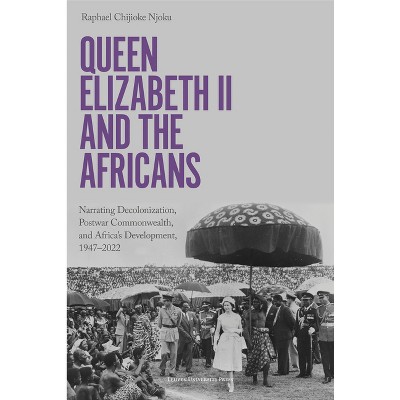Sponsored

Interpretation for Liberation - by Ernst Wolff (Paperback)
In Stock
Sponsored
About this item
Highlights
- African philosophical hermeneutics has emerged in response to the predicaments of post-colonial African societies.
- About the Author: Ernst Wolff is professor at the Institute of Philosophy at the KU Leuven.
- 280 Pages
- Political Science, Colonialism & Post-Colonialism
Description
Book Synopsis
African philosophical hermeneutics has emerged in response to the predicaments of post-colonial African societies. Its central premise is that practical responses have a lot to gain from interpreting people's experience of meaning and the disruption of it. But where does understanding originate from? And what are the possibilities and limitations of interpretation as support for practice?
Suspended in the tension between Africa's traumatic past and people's continuing quest for autonomy, African hermeneutics draws on old traditions, adopted ideas and creative reflection. This results in intense intellectual engagement with history and conflict, translation and human nature, epistemic domination and liberation.
This book explores the role of hermeneutics in African philosophy. By examining its leading thinkers, it offers stimulating perspectives for any reader grappling with interpretation, critique, pluralism, decolonization and politics - in Africa and elsewhere.
Review Quotes
Interpretation for Liberation: African Philosophical Hermeneutics is a seminal work by Ernst Wolff. Rich and informed, it provides a pedagogical introduction to the nature and function of hermeneutics as a trend in philosophical practice in general and African philosophy in particular. But where hermeneutics as practiced by ethnophilosophers confines African consciousness to the mystified absolutes of Abrahamic monotheisms, his secular vision of this field finds expression in the thesis: hermeneutics means that human existence has a meaning that calls for an understanding of its varied significances. The author's effort to flesh out an uncertain and even contested academic position in African philosophy is admirable. In his view, this strand of African philosophy attempts to grasp the repercussions and aftermath of socio-historical crises linked to the economic, cultural, and political difficulties of a humanity confronted over the long term with residual forms of inhuman violence and geopolitical power relations resulting from the slave trade, slavery, colonial conquest, oppression, and underdevelopment, from which nevertheless emerges an irrepressible desire for emancipation and self-affirmation. Ernst Wolff conceptualizes from this a humanist ethic, that of a fulfilled and better life together without doing violence to human diversity. Ernst Wolff uses this as a basis for conceptualizing a humanist ethic, that of a fulfilled and better life together without doing violence to human diversity. Focusing on a single author at a time, through a detailed analysis of a philosophical text (author-based approach), the analysis of African hermeneutics is presented as a quest for intercultural dialogue. E. Wolff's methodology also demonstrates a scientific ethic of generosity, humility, and refusal to humiliate. Whether part of an explicit hermeneutic or not, this method appears to E. Wolff as a political resource for resistance. These are therefore situated and contextualized philosophies that seek to make intelligible the constant change in culture, language, social relations, politics, as well as in the objects of interpretation and understanding of everyday existence. This gives this method a rooting in practical life as it is part of a sociopolitical reality. Once engaged with meaning, the act of understanding, the arts of interpretation, and hermeneutics have a connection to power. - Charles Mbele, Université de Yaoundé 1
This important book provides readers with a critical and vivid account of hermeneutics as a means of cultural and political liberation in African philosophy. First, Ernst Wolff presents the nature of hermeneutics and assesses its role in African philosophical traditions. Second, he offers a fresh and thoughtful reading of some of its major representatives. Combining rigorous argumentation with a rare clarity of expression, this well-researched and brilliantly written book will be of enormous value and significance to students and scholars of philosophy and the social sciences. - Kasereka Kavwahirehi, University of Ottawa
Ernst Wolff has written a book that vastly expands the boundaries of African Philosophy by doing what is rarely done in the discipline: taking seriously the ideas and discourses of individual African thinkers and engaging them at the most granular level. Henceforth, it is impossible for anyone who practices or writes about hermeneutics as a philosophical method and mode of thinking to claim ignorance of Africans' place in it. With sophisticated analysis, brilliant summaries that never dumb down the complexities of his chosen thinkers' arguments, and critical sections that invite deeper conversation with the authors and their readers alike, Wolff introduces us to both self-identified hermeneuticists and others whose works lend themselves to hermeneutic interpretation. He has made us abundantly aware of the riches that await questors into one branch of African philosophy: Hermeneutics. I give this book my highest recommendation. - Olúfẹ́mi Táíwò, Cornell University
About the Author
Ernst Wolff is professor at the Institute of Philosophy at the KU Leuven.
Shipping details
Return details
Trending Non-Fiction

















